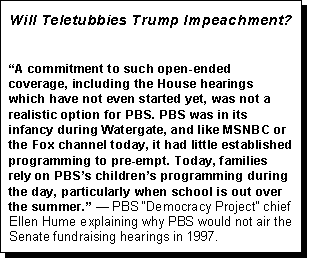 |
|||||||||
|
 |
||
|
 |
||||||||||||||||||||||||
|
||||||||||||||||||||||||
 |
||||||
|
||||||
 |
||||||
|
 |
||||||||||||||||||
|
||||||||||||||||||
 |
||||||||||||||||||||||||
|
||||||||||||||||||||||||
 |
||||||||||||||||||
|
||||||||||||||||||
|
|
|
Friday, October 16, 1998 - Vol. Two, No. 42 - Media Inquiries: Keith Appell (703) 683-5004

Your Tax Dollars Brought You Wall-to-Wall Watergate and Iran-Contra, But Not Live Clinton Coverage Public Broadcasting: Still a Partisan Tool National Public Radio legal reporter Nina Totenberg is the White House's favorite journalist of the week. She quoted an unnamed Justice Department official on Wednesday's All Things Considered saying it was "breathtaking" that independent counsel Kenneth Starr did not tell Janet Reno that he'd had six conversations with Paula Jones lawyer Gilbert Davis in 1994. Totenberg's source maintained this would have caused Attorney General Janet Reno to disallow his request to investigate the Monica Lewinsky affair.
Other than MSNBC (where Keith Olbermann asked if this would be enough to get Starr fired) and CNBC (where Geraldo Rivera put Totenberg's charges on the front burner), other media outlets yawned at this supposed scoop. (The Washington Post wrote "News organizations, including The Washington Post, reported those contacts in January.") But Democrats on the House Judiciary Committee have added Totenberg's suggestive story to their quiver of arrows aimed at Starr when he testifies before their impeachment inquiry. Once again, Totenberg, who broke Anita Hill's unproven sexual harassment allegations against Clarence Thomas in 1991 and compared her Hill leaks to Watergate and the Pentagon Papers, covers the Paula Jones case as a politically injurious "Clinton-bashing" enterprise. Despite their role in promoting the Hill story, NPR ignored Jones' sexual harassment charges against Clinton for three months until Jones filed a lawsuit. NPR hasn't had much more enthusiasm for the Lewinsky story. The Newseum's Web site carried this dismissal: "'NPR has been behind on the story (of allegations against President Clinton), but we've been deliberately behind,' National Public Radio's Jeffrey Dvorkin said at an Inside Media program on March 20. 'So much of this has been innuendo, has not been sourced properly. We've tried [to focus on] how this affects the presidency.'" PBS showed a similar lack of Lewinsky fervor. Just 13 days into the story in January, The NewsHour with Jim Lehrer ran a segment on the media's "rush to judgment." As the commercial networks all aired the President's videotaped perjury before the grand jury, PBS ran its kiddie shows. They also skipped live coverage of the impeachment debate in the House Judiciary Committee and the full House. PBS took the same hands-off approach with the Senate fundraising hearings last year. [See box.] Yes, PBS broadcast the Watergate hearings live during the day and again at night on more than 150 stations nationwide. Yes, PBS brought the Iran-Contra hearings to America live. But now, in the age of cable news and C-SPAN, the time's reserved for Barney and the Teletubbies. For the third of Americans who don't have cable -- and those deprived viewers are the target PBS pledges to cherish and serve at congressional funding request time -- it's public affairs be damned. If PBS and NPR were hard-breathing cops on the scandal beat during Republican administrations, they've spent the Clinton years at the donut shop. -- Tim Graham

Home | News Division
| Bozell Columns | CyberAlerts |







 Totenberg appeared on Good
Morning America Thursday (in her role as an ABC News "contributor") to
repeat the anonymous revelations. This official clashed with Reno, who told ABC's Aaron
Brown on the same show: "I can't comment because we're reviewing all the issues at
this point."
Totenberg appeared on Good
Morning America Thursday (in her role as an ABC News "contributor") to
repeat the anonymous revelations. This official clashed with Reno, who told ABC's Aaron
Brown on the same show: "I can't comment because we're reviewing all the issues at
this point."